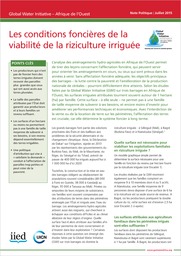Focal point
Location
Mission
Our mission is to build a fairer, more sustainable world, using evidence, action and influence in partnership with others.
Who we are
IIED is one of the world’s most influential international development and environment policy research organisations. Founded in 1971 by economist Barbara Ward, who forged the concept and cause of sustainable development, we work with partners on five continents. We build bridges between policy and practice, rich and poor communities, the government and private sector, and across diverse interest groups. We contribute to many international policy processes and frameworks, including the Intergovernmental Panel on Climate Change, the Millennium Ecosystem Assessment and the UN conventions on climate change and biological diversity.
What we do
IIED carries out research, advice and advocacy work. We carry out action research — generating robust evidence and know-how that is informed by a practical perspective acquired through hands-on research with grassroots partners — and we publish in journals and maintain high research standards. We advise government, business and development agencies, and we argue for changes in public policy. We focus on bottom-up solutions, stay open to flexible, adaptable solutions and are marked by a tradition of challenging conventional wisdom through original thinking.
Resources
Displaying 181 - 185 of 367Les conditions foncières de la viabilité de la riziculture irriguée
L’analyse des aménagements hydro-agricoles en Afrique de l’Ouest permet de tirer des leçons concernant l’affectation foncière, qui peuvent servir pour orienter les aménagements en cours, ou ceux qui sont prévus dans les années à venir. Sans affectation foncière adéquate, les objectifs principaux des barrages – la lutte contre la pauvreté et l’amélioration de la production nationale de céréales – pourront difficilement être atteints.
A Time for Change? Comments on Chad’s draft Land Code
The process to develop a new Land Code in Chad is a positive step forward but the draft reflects a highly centralised system of land ownership, management and administration which risks excluding most people from the means to document and protect their land rights while also fostering widespread tenure insecurity. It considers customary rights as ‘temporary’ and gives full legal protection to a land title, which converts customary rights into land ownership, which is likely to be inaccessible for the vast majority of the population.
Commercialisation of land and ‘Land Grabbing’: Implications for Land Rights and Livelihoods in Malawi
Investigates the processes and impact of commercialisation of land in Malawi – specifically the acquisition of huge tracts of communal lands by foreign companies and local elites for sugarcane production in Nkhotakota and Chikwawa districts. The main finding was that ‘land grabbing’ for large-scale commercial agriculture in these two districts negatively affected the livelihoods of the poor communal farmers. The costs to the affected communities outweighed the benefits
Land Governance in Malawi: Lessons from Large-Scale Acquisitions
Includes key policy areas; the legal framework governing land in Malawi; the Green Belt initiative and the New Alliance: threats or development opportunities?; case studies of large-scale acquisitions in Malawi – out-grower schemes in Nkhotakota and Chikwawa districts; recommendations. Brief illustrates the further accelerate land concentration among local elites and the exposure of many to landlessness and food insecurity.
Large-scale land deals in Southern Africa: voices of the people
Dramatic changes are underway in Southern Africa, with growing interest by foreign and domestic investors to access land for farming, mining and other commercial operations. This book of case studies documents situations in which commercial projects are planned or are being implemented on land held by rural communities in Malawi, Mozambique, Namibia, Zambia and Zimbabwe. It aims to provide an accessible and vivid window into the lived realities, views and responses of rural people who are affected by such deals.





